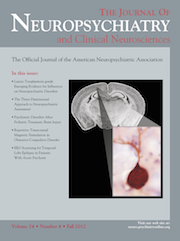Alexithymia Is Associated With Impulsivity in Newly-Diagnosed, Drug-Naïve Patients With Parkinson’s Disease: An Affective Risk Factor for the Development of Impulse-Control Disorders?
To the Editor: Depression has a high prevalence in patients with Parkinson’s disease1 (PD) and has been associated with alexithymia,2 a clinical phenomenon related to an alteration in affect-regulation.
We investigated the relationships between symptoms of negative affect (depression and alexithymia) and other neuropsychiatric symptoms in newly-diagnosed, drug-naïve (de novo) PD patients. We enrolled 42 de novo patients who fulfilled research diagnostic criteria for idiopathic PD and 30 age-matched healthy controls (HC). Both groups underwent a neuropsychiatric assessment including the Toronto Alexithymia Scale 20-item (TAS-20), the Geriatric Depression Scale Short Form (GDS-15), the Barratt Impulsiveness Scale (BIS-11), the Maudsley Obsessive-Compulsive Questionnaire (MOCQ-R), and the Hamilton Rating Scale for Anxiety (Ham-A). Informed consent was obtained in compliance with research standards for human research for all participating institutions and in accordance with the Helsinki Declaration.
PD and HC groups did not differ in age, education, alexithymia, depression, impulsivity or anxiety (Table 1), whereas PD patients reported higher scores, as compared with HC, on the MOCQ-R Total score (p=0.038). In both groups, alexithymia correlated significantly with depression (PD: ρ=0.412; p=0.007; HC: ρ=0.819; p <0.001), and impulsivity (PD: ρ=0.316; p=0.041; HC: ρ=0.452; p=0.027). In each group, stepwise regression analyses showed that alexithymia predicted depression (PD: F=14.696; p <0.001; HC: F=44.926; p <0.001), and impulsivity (PD: F=5.063; p=0.029; HC: F=5.642; p=0.027). Considering TAS-20 factors (F-1: Difficulty Identifying Feelings; F-2: Difficulty Describing Feelings; F-3: Difficulty Focusing on Inner Affective Experience), depression was predicted by F-1 in PD (F=18.718; p <0.01) and by F-2 in HC (F=38.47; p <0.01), and impulsivity was predicted only by F-1 in both groups (PD: F=4.812; p <0.05; HC: F=13.450; p=0.01).
| Healthy Controls (N=30) | De Novo PD Patients (N=42) | |
|---|---|---|
| Age, years | 66.08 (7.62) | 64.97 (7.87) |
| Sex: M/F | 18/12 | 28/14 |
| Education, years | 8.58 (3.76) | 9.33 (4.31) |
| UPDRS–II | — | 8.19 (4.77) |
| UPDRS–III | — | 18.24 (12.60) |
| MMSE | 28.93 (1.17) | 28.01 (1.52) |
| TAS–20 | 49.33 (11.06) | 50.54 (12.47) |
| GDS–15 | 4.15 (4.15) | 4.54 (3.52) |
| BIS–11 | 64.67 (9.65) | 64.83 (9.24) |
| MOCQ–R | 3.00 (2.53) | 4.71 (3.47)* |
| Ham–A | 5.21 (2.17) | 5.80 (3.80) |
In de novo PD patients, as in HC, alexithymia was associated with depression and impulsivity, but these neuropsychiatric features were not associated. In addition to the known association between alexithymia and depression2 in both groups, impulsivity was predicted by alexithymia, and, considering TAS-20 factors, only by the TAS-20 F-1 factor. This finding is partially at variance with findings reported in a study with healthy subjects,3 in which impulsivity was not found to be associated with the TAS-20 total score, in contrast with our study, but only with the TAS-20 F-1 factor, as we found for PD and HC. Therefore, alexithymic difficulty in identifying one's own feelings could factor into situations where there is rapid respond to cues for potential reward without much planning or deliberation and without consideration of potential punishment or loss of reward, as defines impulsivity.4 Considering that dopamine agonists adopted to treat PD motor symptoms may increase impulsivity and the risk of developing impulse-control disorders,5 the clinical implication of this finding is that the presence of alexithymic features, especially the difficulty in identifying one's own feelings, could represent a risk factor for the development of impulse-control disorders when patients are treated with dopamine agonists. This hypothesis, which deserves further empirical investigation, highlights the importance of assessing multiple mental health domains, including alexithymia, in de novo PD patients, in order to prevent and/or better manage possible neuropsychiatric side effects of dopaminergic drugs.
1 : A systematic review of prevalence studies of depression in Parkinson’s disease. Mov Disord 2008; 23:183–189, quiz 313Crossref, Medline, Google Scholar
2 : Alexithymia is associated with depression in de novo Parkinson’s disease. Psychother Psychosom 2011; 80:251–253Crossref, Medline, Google Scholar
3 : Alexithymia assessment and relations with dimensions of personality. Eur J Psychol Assess 2005; 21:32–33Crossref, Google Scholar
4 : Personality and risk-taking: common biosocial factors. J Pers 2000; 68:999–1029Crossref, Medline, Google Scholar
5 : Impulse control disorders in Parkinson disease: a cross-sectional study of 3,090 patients. Arch Neurol 2010; 67:589–595Crossref, Medline, Google Scholar



